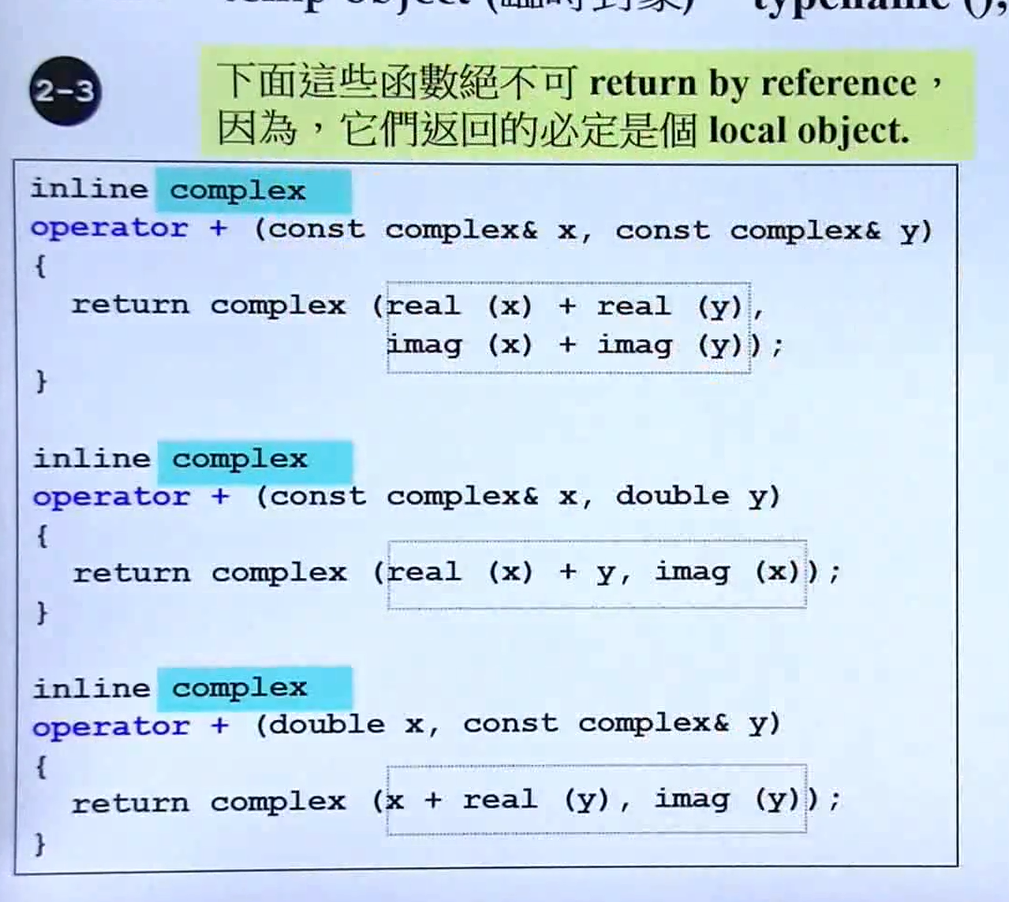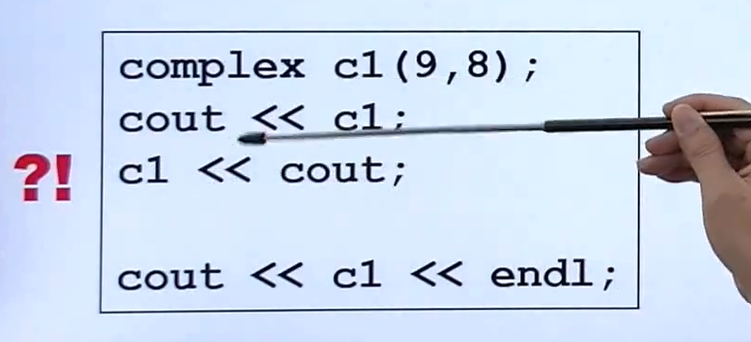侯捷《C++面向对象开发》——动手实现自己的复数类
前言
最近在看侯捷的一套课程《C++面向对象开发》,刚看完第一节introduction之后就被疯狂圈粉。感觉侯捷所提及所重视的部分也正是我一知半解的知识盲区,我之前也写过一些C++面向对象的程序,不过正如侯捷所说,我还仅仅停留于Object-based层面,写程序时总是在想如何封装好一个类,而不是Object-oriented强调类与类之间关系的设计。
这门课程分为两部分,第一部分讲Object-based,第二部分讲Object-oriented;第一部分又分为两部分:带指针的类的封装和不带指针类的封装。
本文将以模板库中的complx复数类的部分内容为核心,在分析源代码的同时,讲解一些良好的代码风格和编程习惯,比如inline内联函数的使用、friend友元函数的使用、函数参数及返回值何时pass by value何时pass by reference等等。
部分代码
complex.h
1 #ifndef __COMPLEX__ 2 #define __COMPLEX__ 3 4 class complex 5 { 6 public: 7 complex(double r = 0, double i = 0) 8 : re (r), im (i) 9 { } 10 complex& operator += (const complex&); 11 double real () const { return re; } 12 double imag () const { return im; } 13 private: 14 double re, im; 15 16 friend complex& __doapl (complex*, const complex&); 17 }; 18 19 #endif
complex.cpp
1 #include "complex.h" 2 #include <iostream> 3 4 using namespace std; 5 6 inline complex& __doapl(complex* ths, const complex& r) 7 { 8 ths->re += r.re; 9 ths->im += r.im; 10 return *ths; 11 } 12 13 inline complex& complex::operator += (const complex& r) 14 { 15 return __doapl (this, r); 16 } 17 18 inline double imag (const complex& x) 19 { 20 return x.imag (); 21 } 22 23 inline double real (const complex& x) 24 { 25 return x.real (); 26 } 27 28 inline complex operator + (const complex& x, const complex& y) 29 { 30 return complex (real (x) + real (y), imag (x) + imag (y)); 31 } 32 33 inline complex operator + (const complex& x, double y) 34 { 35 return complex (real (x) + y, imag (x)); 36 } 37 38 inline complex operator + (double x, const complex& y) 39 { 40 return complex (x + real (y), imag (y)); 41 } 42 43 ostream& operator << (ostream& os, const complex& x) 44 { 45 return os << ' (' << real (x) << "," << imag (x) << ')'; 46 }
源码解析
一、complex.h
1.1 initialization list
//程序1.1
complex(double r = 0, double i = 0)
: re (r), im (i)
{ }
构造函数参数缺省,比较常规。
值得注意的是,变量的初始化尽量放在初始化列表中(initialization list)。当然,完全可以在构造函数的函数体中赋值进行初始化。不过,侯捷指出,一个对象在产生过程中分为初始化和成功产生两部分,initialization list相当于在初始化过程中对变量赋值,而在函数体中赋值则是放弃了initialization list初始化这一过程,会降低效率。对于“性能榨汁机”的C++语言来讲,重视每个细节效率的重要性是毫无疑问的。
1.2参数及返回值传递方式
//程序1.2 2
complex& operator += (const complex&);
传递参数时,如果能用引用传递那么一定不要用值传递,因为值传递的过程中变量需要copy一份样本传入函数中,当参数很多或参数类型复杂时,会导致效率变慢。
其次,如果函数不会改变参数的值,一定要加const限定,在初学时养成良好的变成习惯尤为重要。
关于函数的返回值,同样是最好按引用传递,当然,有些情况无法按引用传递,这点将在2.3讲解。
其实,参数列表中还隐藏一个this,这点将在2.2讲解。
1.3友元函数
//程序1.3
friend complex& __doapl (complex*, const complex&);
我们可以看到,在complex.h文件的末尾定义了一个友元函数,友元函数打破了类的封装,它不是类的成员函数,却可以使用点操作符来获取类的private变量。当然,非友元函数也可以通过get函数来获取,不过速度会慢一些。
二、complex.cpp
2.1 友元函数及内联函数
//程序2.1
inline complex& __doapl(complex* ths, const complex& r)
{
ths->re += r.re;
ths->im += r.im;
return *ths;
}
我们首先来分析一下这个友元函数,这里有两点值得探讨:
第一这个函数将r的实部和虚部加到ths上,r在函数体中值没用发生改变,所以使用const限定。
第二这个函数被设计成inline内联函数,我们都知道,内联函数是把代码块直接复制到函数需要调用的地方,通过省略函数调用这一过程来提高效率,那么我们为什么不将所有函数都设计成内联函数呢?其实我们的inline声明只是对编译器的一个建议,对于过于复杂的函数来讲,及时我们声明了inline,编译器也会调用执行。所以,对于一些“小巧”的函数,我们尽量设计为内联函数。
2.2 隐藏的“this”
//程序2.2
inline complex& complex::operator += (const complex& r)
{
return __doapl (this, r);
}
操作符重载作为C++的特点之一,有令别的语言羡慕之处,当然也有些难以理解。
实际上,这个函数的参数还有一个隐藏的this,这个this就是函数调用者。
2.3 不能为reference的返回值
//程序2.3
inline complex operator + (const complex& x, const complex& y)
{
return complex (real (x) + real (y), imag (x) + imag (y));
}
inline complex operator + (const complex& x, double y)
{
return complex (real (x) + y, imag (x));
}
inline complex operator + (double x, const complex& y)
{
return complex (x + real (y), imag (y));
}
注意,这里函数的返回值不能返回reference,这其实是使用临时对象(typename ()),在函数体内定义变量,然后把这个变量的引用传递出去,函数结束后变量本体死亡,传出去的引用既没有意义了。
2.4 非成员函数的操作符重载
//程序2.4
ostream& operator << (ostream& os, const complex& x)
{
return os << ' (' << real (x) << "," << imag (x) << ')';
}
下面讲一下为什么有的操作符重载函数定义成非成员函数?
我们知道,操作符重载只作用在左边的操作数上,试想一下,如果把“<<”定义为成员函数,那每次调用岂不是要这样c1 << cout
完整代码
以上就是我在学习过程中特别注意的地方,下面给出complex类完整代码,只不过多了几种操作运算,大体思路完全一致。
complex.h
1 #ifndef __MYCOMPLEX__ 2 #define __MYCOMPLEX__ 3 4 class complex; 5 complex& 6 __doapl (complex* ths, const complex& r); 7 complex& 8 __doami (complex* ths, const complex& r); 9 complex& 10 __doaml (complex* ths, const complex& r); 11 12 13 class complex 14 { 15 public: 16 complex (double r = 0, double i = 0): re (r), im (i) { } 17 complex& operator += (const complex&); 18 complex& operator -= (const complex&); 19 complex& operator *= (const complex&); 20 complex& operator /= (const complex&); 21 double real () const { return re; } 22 double imag () const { return im; } 23 private: 24 double re, im; 25 26 friend complex& __doapl (complex *, const complex&); 27 friend complex& __doami (complex *, const complex&); 28 friend complex& __doaml (complex *, const complex&); 29 }; 30 31 32 inline complex& 33 __doapl (complex* ths, const complex& r) 34 { 35 ths->re += r.re; 36 ths->im += r.im; 37 return *ths; 38 } 39 40 inline complex& 41 complex::operator += (const complex& r) 42 { 43 return __doapl (this, r); 44 } 45 46 inline complex& 47 __doami (complex* ths, const complex& r) 48 { 49 ths->re -= r.re; 50 ths->im -= r.im; 51 return *ths; 52 } 53 54 inline complex& 55 complex::operator -= (const complex& r) 56 { 57 return __doami (this, r); 58 } 59 60 inline complex& 61 __doaml (complex* ths, const complex& r) 62 { 63 double f = ths->re * r.re - ths->im * r.im; 64 ths->im = ths->re * r.im + ths->im * r.re; 65 ths->re = f; 66 return *ths; 67 } 68 69 inline complex& 70 complex::operator *= (const complex& r) 71 { 72 return __doaml (this, r); 73 } 74 75 inline double 76 imag (const complex& x) 77 { 78 return x.imag (); 79 } 80 81 inline double 82 real (const complex& x) 83 { 84 return x.real (); 85 } 86 87 inline complex 88 operator + (const complex& x, const complex& y) 89 { 90 return complex (real (x) + real (y), imag (x) + imag (y)); 91 } 92 93 inline complex 94 operator + (const complex& x, double y) 95 { 96 return complex (real (x) + y, imag (x)); 97 } 98 99 inline complex 100 operator + (double x, const complex& y) 101 { 102 return complex (x + real (y), imag (y)); 103 } 104 105 inline complex 106 operator - (const complex& x, const complex& y) 107 { 108 return complex (real (x) - real (y), imag (x) - imag (y)); 109 } 110 111 inline complex 112 operator - (const complex& x, double y) 113 { 114 return complex (real (x) - y, imag (x)); 115 } 116 117 inline complex 118 operator - (double x, const complex& y) 119 { 120 return complex (x - real (y), - imag (y)); 121 } 122 123 inline complex 124 operator * (const complex& x, const complex& y) 125 { 126 return complex (real (x) * real (y) - imag (x) * imag (y), 127 real (x) * imag (y) + imag (x) * real (y)); 128 } 129 130 inline complex 131 operator * (const complex& x, double y) 132 { 133 return complex (real (x) * y, imag (x) * y); 134 } 135 136 inline complex 137 operator * (double x, const complex& y) 138 { 139 return complex (x * real (y), x * imag (y)); 140 } 141 142 complex 143 operator / (const complex& x, double y) 144 { 145 return complex (real (x) / y, imag (x) / y); 146 } 147 148 inline complex 149 operator + (const complex& x) 150 { 151 return x; 152 } 153 154 inline complex 155 operator - (const complex& x) 156 { 157 return complex (-real (x), -imag (x)); 158 } 159 160 inline bool 161 operator == (const complex& x, const complex& y) 162 { 163 return real (x) == real (y) && imag (x) == imag (y); 164 } 165 166 inline bool 167 operator == (const complex& x, double y) 168 { 169 return real (x) == y && imag (x) == 0; 170 } 171 172 inline bool 173 operator == (double x, const complex& y) 174 { 175 return x == real (y) && imag (y) == 0; 176 } 177 178 inline bool 179 operator != (const complex& x, const complex& y) 180 { 181 return real (x) != real (y) || imag (x) != imag (y); 182 } 183 184 inline bool 185 operator != (const complex& x, double y) 186 { 187 return real (x) != y || imag (x) != 0; 188 } 189 190 inline bool 191 operator != (double x, const complex& y) 192 { 193 return x != real (y) || imag (y) != 0; 194 } 195 196 #include <cmath> 197 198 inline complex 199 polar (double r, double t) 200 { 201 return complex (r * cos (t), r * sin (t)); 202 } 203 204 inline complex 205 conj (const complex& x) 206 { 207 return complex (real (x), -imag (x)); 208 } 209 210 inline double 211 norm (const complex& x) 212 { 213 return real (x) * real (x) + imag (x) * imag (x); 214 } 215 216 ostream& 217 operator << (ostream& os, const complex& x) 218 { 219 return os << '(' << real (x) << ',' << imag (x) << ')'; 220 } 221 222 #endif //__MYCOMPLEX__
complex_test.cpp
1 #include <iostream> 2 #include "complex.h" 3 4 using namespace std; 5 6 int main() 7 { 8 complex c1(2, 1); 9 complex c2(4, 0); 10 11 cout << c1 << endl; 12 cout << c2 << endl; 13 14 cout << c1+c2 << endl; 15 cout << c1-c2 << endl; 16 cout << c1*c2 << endl; 17 cout << c1 / 2 << endl; 18 19 cout << conj(c1) << endl; 20 cout << norm(c1) << endl; 21 cout << polar(10,4) << endl; 22 23 cout << (c1 += c2) << endl; 24 25 cout << (c1 == c2) << endl; 26 cout << (c1 != c2) << endl; 27 cout << +c2 << endl; 28 cout << -c2 << endl; 29 30 cout << (c2 - 2) << endl; 31 cout << (5 + c2) << endl; 32 33 return 0; 34 }
总结
作为初学者,一定要养成良好的编程习惯,正如侯捷所说:“一出手就是大家风范”。




